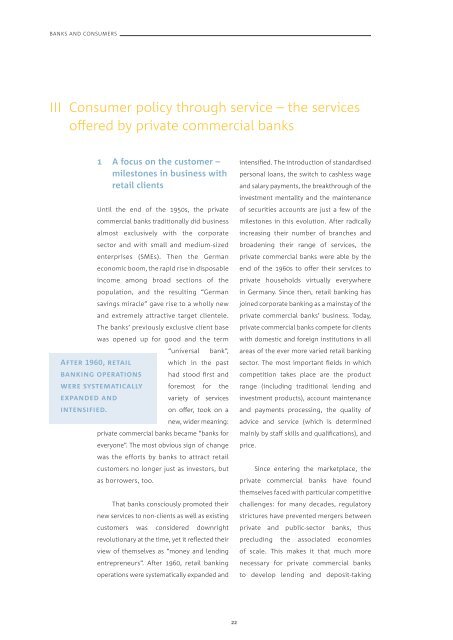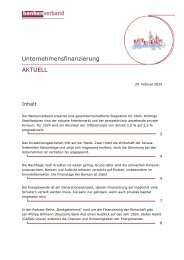Banks and Consumers
The Comprehensive Consumer Policy Scheme of the German Private Commercial Banks
The Comprehensive Consumer Policy Scheme of the German Private Commercial Banks
Create successful ePaper yourself
Turn your PDF publications into a flip-book with our unique Google optimized e-Paper software.
BANKS AND CONSUMERS<br />
III Consumer policy through service – the services<br />
offered by private commercial banks<br />
1 A focus on the customer –<br />
milestones in business with<br />
retail clients<br />
Until the end of the 1950s, the private<br />
commercial banks traditionally did business<br />
almost exclusively with the corporate<br />
sector <strong>and</strong> with small <strong>and</strong> medium-sized<br />
enterprises (SMEs). Then the German<br />
economic boom, the rapid rise in disposable<br />
income among broad sections of the<br />
population, <strong>and</strong> the resulting “German<br />
savings miracle” gave rise to a wholly new<br />
<strong>and</strong> extremely attractive target clientele.<br />
The banks’ previously exclusive client base<br />
was opened up for good <strong>and</strong> the term<br />
“universal bank”,<br />
AFTER 1960, RETAIL<br />
which in the past<br />
BANKING OPERATIONS had stood first <strong>and</strong><br />
WERE SYSTEMATICALLY foremost for the<br />
EXPANDED AND<br />
variety of services<br />
INTENSIFIED.<br />
on offer, took on a<br />
new, wider meaning:<br />
private commercial banks became “banks for<br />
everyone”. The most obvious sign of change<br />
was the efforts by banks to attract retail<br />
customers no longer just as investors, but<br />
as borrowers, too.<br />
That banks consciously promoted their<br />
new services to non-clients as well as existing<br />
customers was considered downright<br />
revolutionary at the time, yet it reflected their<br />
view of themselves as “money <strong>and</strong> lending<br />
entrepreneurs”. After 1960, retail banking<br />
operations were systematically exp<strong>and</strong>ed <strong>and</strong><br />
intensified. The introduction of st<strong>and</strong>ardised<br />
personal loans, the switch to cashless wage<br />
<strong>and</strong> salary payments, the breakthrough of the<br />
investment mentality <strong>and</strong> the maintenance<br />
of securities accounts are just a few of the<br />
milestones in this evolution. After radically<br />
increasing their number of branches <strong>and</strong><br />
broadening their range of services, the<br />
private commercial banks were able by the<br />
end of the 1960s to offer their services to<br />
private households virtually everywhere<br />
in Germany. Since then, retail banking has<br />
joined corporate banking as a mainstay of the<br />
private commercial banks’ business. Today,<br />
private commercial banks compete for clients<br />
with domestic <strong>and</strong> foreign institutions in all<br />
areas of the ever more varied retail banking<br />
sector. The most important fields in which<br />
competition takes place are the product<br />
range (including traditional lending <strong>and</strong><br />
investment products), account maintenance<br />
<strong>and</strong> payments processing, the quality of<br />
advice <strong>and</strong> service (which is determined<br />
mainly by staff skills <strong>and</strong> qualifications), <strong>and</strong><br />
price.<br />
Since entering the marketplace, the<br />
private commercial banks have found<br />
themselves faced with particular competitive<br />
challenges: for many decades, regulatory<br />
strictures have prevented mergers between<br />
private <strong>and</strong> public-sector banks, thus<br />
precluding the associated economies<br />
of scale. This makes it that much more<br />
necessary for private commercial banks<br />
to develop lending <strong>and</strong> deposit-taking<br />
22


















